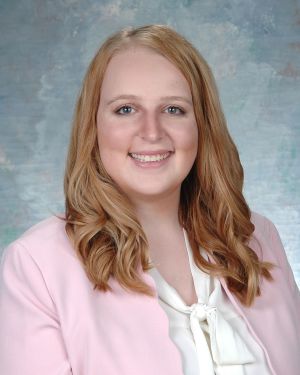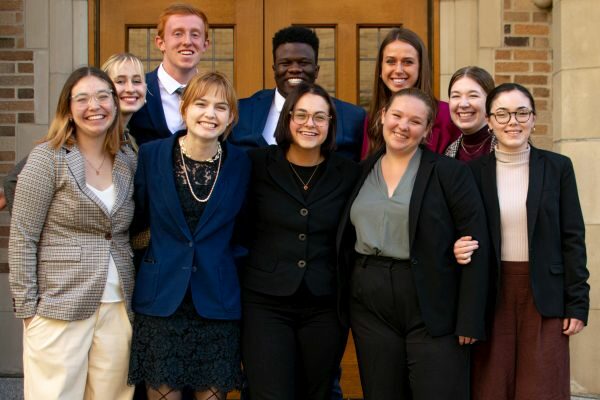
Mock Trial: Defined
At its most basic level, students on the Mock Trial Team at IUPUI perform as attorneys and witnesses during the litigation of a hypothetical court case.
The Case:
Each August, the team receives a case packet from the American Mock Trial Association (AMTA) which contains evidence, witness affidavits, and other legal materials relating to a hypothetical court case. Each year the cases alternate between civil and criminal matters. The case will remain the same for the entire season, which ends around March. Previous cases include:
- Danny Kosack, an animal trainer, and her chimpanzee, Elias, arrived on the set of Midland’s After Dark with Alex Grace for a pre-show rehearsal. After a couple of minutes on stage, Elias became agitated. He began screaming and jumping up and down. Alex Grace suddenly reached out for Elias, and Elias jumped off the stage and began to attack one of MTS’s writers, Chris Villafana, ultimately leading to his death. (2018/19 case: MTS v. Kosack).
- Just as businesses were starting to open up from the pandemic, Dakota Sutcliffe was ready to unveil the new and improved Chuggies. After months of not being able to make payments due to the pandemic, Chuggies was finally open and things were beginning to turn around for the small business owner. That was until an employee tested positive for COVID and Chuggies had to shut down, again. This meant that the hundreds of thousands of dollars of renovations that had just taken place at Chuggies would need to be paid for very soon. Without any customers coming through the door and bills mounting, Dakota realized something, that their hard work could pay off, but insurance would pay more. (2021/22 case: State of Midlands v. Dakota Sutcliffe)
- When we look back at July 4th, 2021, it was a beautiful clear day ready for all the festivities to come. Some of the people of Midlands chose to spend their day at Basin Beach but Reese Campbell and Morgan Felder spent their day in the skies. The two jumped aboard a Horizon P-229 and began a new sightseeing flight route for their company Koller Campbell Air LLC. But while in flight, tragedy struck: their plane crashed into Mount McIntosh, leaving no survivors. (2022/23 case: Ari Felder v. Koller Campbell Air LLC. )
- On Halloween night, guests arrive to Miller Tower to attend the annual Sohi Children’s Hospital Charity Gala. While dressed in costumes, they dance and drink while bidding on rare, historical artifacts. Suddenly, four armed criminals land onto the helipad of Miller Tower, use axes to break into the building, raid the vault, steal over 20 million dollars worth auction items, assault a security guard, and fly away in their helicopter. After hearing these events, FBI Agent Shar Burke was immediately convinced that this was the product of the “Morisot Mastermind,” an alleged art thief that Agent Burke has been chasing for the past 5 years. (2023/24 case: State of Midlands v. B.F. De La Porta and Poe Cameron)
Preparation:
The team must prepare to litigate each side of the case. For example, in a criminal case, the team must prepare a prosecution case and a defense case. Students will perform as an attorney and/or a witness.
- Attorneys are required to ask questions during witness examination and perform longer speeches in an opening statement or closing argument. Additionally, a modified version of the Federal Rules of Evidence apply and the student attorneys are required to object to their opponent’s material as well as respond to objections.
- Witnesses must perform as a character in the case by responding to questions asked during direct and cross examinations. Witnesses take a variety of forms. In past seasons students have performed as victims to an attempted murder, a member of a rock band who witnessed a chimpanzee attack, and an eccentric billionaire on trial for conspiring to steal millions of dollars worth of art from a charity gala.
Competitions:
Before Regionals, the team will travel to other universities to compete in invitational tournaments. Each tournament follows the same structure. On Saturday, the team will participate in two trials; one morning round where they argue one side of the case and one afternoon round where they argue the other side. The next day, they will compete in another two rounds. For example, a tournament schedule could look like:
- Round 1: Saturday Morning, the team presents the prosecution case;
- Round 2: Saturday Afternoon, the team presents the defense case;
- Round 3: Sunday Morning, performs as defense;
- Round 4: Sunday Afternoon, performs as prosecution;
During each round, three (3) students will perform as attorneys and three (3) students will perform as witnesses. Because AMTA limits each team to a maximum of 10 members per university roster, this means some students will perform for both sides of the case. For example, Grace could be a prosecution attorney and a defense witness; Ethan could perform as a plaintiff attorney and as a defense attorney; Cora can perform as the victim on the prosecution’s case and then as the defendant on the other side. The six members from our team will compete against six students from another university who represent the opposite side of the case. For example, a tournament schedule could look like:
- Round 1: Saturday Morning, IUPUI as the Plaintiff v. IU Bloomington as Defense
- Round 2: Saturday Afternoon, Notre Dame as the Plaintiff v. IUPUI as Defense
- Round 3: Sunday Morning, Ball State as the Plaintiff v. IUPUI as Defense
- Round 4: Sunday Afternoon, IUPUI as the Plaintiff v. Purdue as Defense
Competitions: Scoring
Each round of mock trial includes “judges” – usually law students, attorneys, or real-life judges – who rule on objections and control the courtroom, just like real life. Additionally, these judges score student performances by filling out “ballots.” Students receive a score 1-10 for the following trial performances:
- Opening Statement for the Prosecution/Plaintiff
- Opening Statement for the Defense
- Prosecution/Plaintiff Case and Chief
- Direct Examination by Prosecution/Plaintiff Attorney (x3)
- Witness answers during Direct Examination (x3)
- Cross Examination by Defense Attorney (x3)
- Witness answers during Direct Examination (x3)
- Defense Case and Chief
- Direct Examination by Defense Attorney (x3)
- Witness answers during Direct Examination (x3)
- Cross Examination by Prosecution/Plaintiff Attorney (x3)
- Witness answers during Direct Examination (x3)
- Closing Argument for the Prosecution/Plaintiff
- Closing Argument for the Defense
The goal is to just score more points than your opponent. If your team earns the most points, you win the “ballot.” A perfect score for a team 140 points (10 points for opening statement, 90 for team’s case and chief, 30 from cross examining the other team’s witnesses, and 10 points for our closing argument). Each team can win up to two ballots per round; a possible eight ballots per tournament.
Competitions: Awards
Team awards are given to the teams that have won the most ballots. Usually it takes at least 7 ballots to earn 1st place at a tournament. When there are ties, teams are further ranked by point differential and the difficulty of their opponents.
In addition to providing numerical scores, each judge is required to rank the top four attorneys and top 4 witnesses from each round (at the bottom of each ballot). These ranks can earn a student an individual award for performing as an “Outstanding Attorney” or an “Outstanding Witness.” Points are awarded as follows: 5 points for first rank, 4 points for second, 3 points for third, and 2 points for fourth.
Ranks are side and role specific. For example, let’s say Grace is a prosecution attorney and a defense witness. During a tournament, Grace is ranked:
- Round 1: Prosecution Attorney
- #1 on Judge 1’s ballot and #1 on the other ballot.
- Round 2: Defense Witness
- #2 on Judge 1’s ballot and #1 on the other ballot.
- Round 3: Defense Witness
- #2 on Judge 1’s ballot and #4 on the other ballot.
- Round 4: Prosecution Attorney
- #1 on Judge 1’s ballot and #1 on the other ballot.
Therefore, Grace earned 20 Ranks (aka Perfect Ranks) for her role as a prosecution attorney. This is a high enough score to win an Outstanding Attorney Award. Additionally, Grace earned 15 Ranks for her role as a defense witness. This may be a high enough score, but will depend on the ranks of all the other witnesses in the tournament. Awards are usually presented to the students who earned the top 10-15 highest scores as attorneys and the top 10-15 highest scores as witnesses.
How do I get selected to be on the team?
Students interested in competing on the Mock Trial Team at IUPUI should reach out via email to head coach Sydney Kadinger (skadinge@iu.edu). Additionally, students can fill out an interest form here: https://www.iupuimt.com/join


